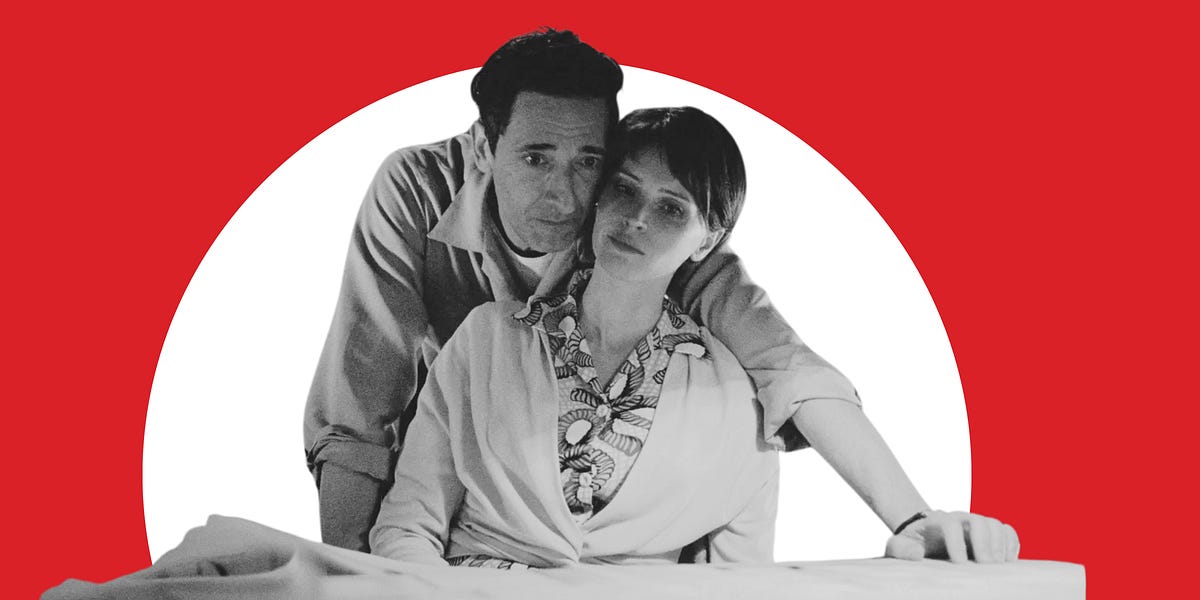Before I get into the first true bit of mudslinging of the Oscar race or a look ahead at this week’s Sundance Film Festival, a programming note. Thursday will bring, at last, the Oscar nominations announcement, hosted by Rachel Sennott and Bowen Yang live at the traditional but still unbearably early hour of 5:30 a.m. PT. I’ll have an episode of the Prestige Junkie podcast (you’re subscribed, right?) out that day to break everything down, and I’ll also be going live on Substack to answer your burning questions with my colleague and eternal awards skeptic Richard Rushfield. Make sure to download the Substack app so you can participate and lob us some questions; see you there!
“The Brutalist is a film about human complexity, and every aspect of its creation was driven by human effort, creativity, and collaboration. We are incredibly proud of our team and what they’ve accomplished here.”
That might sound like a pretty anodyne statement for a director on the Oscar campaign trail, but for Brady Corbet, it was high-stakes damage control after a few days of a very niche social media scandal. Over the weekend, a Jan. 11 interview from the tech-focused movie site RedShark went viral, in which The Brutalist’s editor Dávid Jancsó discussed, among many other things, the film’s use of AI to improve the Hungarian dialogue for stars Adrien Brody and Felicity Jones.
“It is controversial in the industry to talk about AI, but it shouldn’t be,” Janscó said, seemingly unaware he was about to start the most heated backlash cycle of this awards season. “We should be having a very open discussion about what tools AI can provide us with. There’s nothing in the film using AI that hasn’t been done before. It just makes the process a lot faster. We use AI to create these tiny little details that we didn’t have the money or the time to shoot.”
An open discussion about AI did follow, but probably not the one Janscó — or anyone on the awards campaign for The Brutalist — was hoping for. “Gross and evil,” a gif of a sobbing Brad Pitt in Seven, and “I will kill myself in front of the Academy” were not even the most overwrought responses.
That last quote, as it happens, came from an X account that uses a picture of Timothée Chalamet as its avatar and has been busily reposting more critiques of The Brutalist and AI as well as praise for A Complete Unknown. It doesn’t take too much conspiracy thinking to wonder if the sudden explosion of a nine-day-old interview from an obscure film tech website is somehow connected to the tight best actor race between Chalamet and Brody. And it wouldn’t even take an army of publicists on the (alleged) level of Justin Baldoni’s to do it — Chalamet’s fans are so numerous and vocal they’re willing to fan these flames all on their own.
The hubbub around AI and The Brutalist — which I suspect Corbet has effectively calmed with this statement — all reflects, of course, our ongoing anxieties about AI and the future it promises (or threatens). “You can’t have a rational conversation being an ostrich here,” Erik Barmack, an AI enthusiast and author of the Ankler’s Reel AI column, says to the skeptics. “You can’t put your head in the sand and say, ‘Go away, AI.’ Where do we think cost-cutting is going to happen?”
Indeed, The Brutalist has been celebrated for its under-$10 million budget, accomplished partly by shooting in low-cost Hungary, but also, in this very specific instance, by deploying AI tools. The Brutalist used Respeecher, an AI voice editing tool that Barmack tells me is extremely common in Hollywood already and only spreading further.
“Weirdly you get a lot of internet snark from people who are independent filmmakers,” Barmack tells me. “It’s like, this could help you. You could make a $10 million film that actually looks like a $50 million film. Was The Brutalist going to have a budget to do endless voiceovers to get that accent right? Maybe that’s the difference between it getting made or not.”
So we’re in a world in which performances can be enhanced in all kinds of digital, invisible ways that may or may not be disclosed by the filmmakers. How are we supposed to figure out best actor or best actress after that? Barmack cited the example of Andy Serkis, whose performance as Gollum in Lord of the Rings more than 20 years ago was enhanced in many ways by motion-capture digital effects — but was considered by many to be worthy of a supporting actor Oscar nomination. (He didn’t get the nod, but still)
The Academy could start forcing productions to disclose their use of AI, the way films currently have to meet diversity and inclusion standards to qualify for best picture — but there’s no telling what kind of can of worms that could open. After all, one of The Brutalist’s top best picture competitors, Emilia Perez, also used the very same Respeecher voice-altering software.
The Brutalist will probably survive being first over the parapet in the war between the Oscars and AI, particularly since it’s a movie about making art despite the compromises required by capitalism. But unlike most awards season Twitter scandals, this one reflects some very real anxieties in the industry that are only going to increase in the years to come.
Here’s a fun experiment for anyone who’s heading to Park City, Utah for Sundance this week: Ask some of the up-and-coming indie filmmakers whether they used AI tools to cut costs on their passion projects! My guess is plenty of them did, but you’ll have a hard time getting a straight answer from just about anyone.
That’s a problem for my colleagues Richard Rushfield and Alison Brower, who will be attending Sundance in person while I catch what I can on the digital platform. In a moment I’ll share Richard and Alison’s picks for can’t-miss titles as well as my own preview — but first, a scorecard of sorts for last year’s edition.
Ever since CODA went from Sundance premiere to its surprise underdog best picture victory in 2022, the festival has earned a reputation for boosting future Oscar hopefuls on a level that hadn’t really been seen since the post-Little Miss Sunshine boom of the early 2000s.
From last year’s edition, the obvious heavy hitter is A Real Pain, which was picked up by Searchlight for $10 million during the fest and has since grossed just a bit more than that in theaters internationally. Kieran Culkin is now favored for a best supporting actor win, Jesse Eisenberg a near-certain nominee for his screenplay, and his film has a good shot at a best picture nomination as well.
A Real Pain is by far the most successful of the narrative features from last year’s Sundance, but a number of others have scored their share of awards season acclaim — I Saw the TV Glow, Good One, Between the Temples, My Old Ass, Ghostlight, Thelma, The Outrun and Didi all received either Gotham or Spirit Awards nominations. And I’ve been consistently delighted by the success of A Different Man, which won Sebastian Stan a Golden Globe earlier this month and still could get him in the best actor category as well, even if his other film The Apprentice continues to share the attention.
It’s in the documentary world where Sundance may now have the most power, as evidenced by the incredible list of titles that premiered there last year alone. Of the 15 films on the Academy’s best documentary shortlist, 10 of them — Black Box Diaries, Daughters, Eno, Frida, Porcelain War, The Remarkable Life of Ibelin, Soundtrack to a Coup d’Etat, Sugarcane, Union and Will & Harper — played or premiered at Sundance.
I’ll be keeping a particular eye on Sundance docs this year, though many of the festival’s top nonfiction titles make their way to the Full Frame Festival here in Durham, N.C. in the spring. As with any festival full of world premieres, though, it’s exceptionally hard to simply look at the description of a Sundance film and decide whether it’s worth your time. Who would have guessed a gentle drama about a girl raised by deaf parents would go on to win best picture?
As for which of this year’s titles you can expect to hear people chattering about, here’s what Team Ankler is looking out for. Richard tells me it’s the midnight films that have captured most of his attention, including the Dev Patel-starring Rabbit Trap and the A24 release Opus (more on that one in a moment).
Alison, meanwhile, has been following the career of director Rashad Frett, who was part of the Sundance Institute’s 2023 Directors Lab, and is looking forward to his film in the U.S. Dramatic Competition category, Ricky. She also suspects that the bona fides of producers Barry Jenkins and Adele Romanski will make Sorry Baby, the directorial debut of comedian Eva Victor, one to watch.
Want more titles? Here’s who’s catching my eye from 2,000 miles away:
The prototypical Sundance director is a twentysomething who scraped together their last few bucks to travel to Park City for their debut film’s premiere. But the festival can also be a worthy stop for more established directors — both those who got their start in the scrappy indie world and your occasional true-blue Hollywood types.
Ira Sachs has been a Sundance stalwart since his second feature, Forty Shades of Blue, won the Grand Jury Prize in 2005. This year he’s reuniting with his star from 2023’s Passages, Ben Whishaw, for Peter Hujar’s Day, a film about the queer New York photographer that co-stars Rebecca Hall. Another filmmaker with a much shorter Sundance history, 27-year-old Cooper Raiff — who broke out with festival favorites Shithouse and Cha Cha Real Smooth — is back with Hal & Harper. The indie TV series stars Mark Ruffalo and Lili Reinhart, and is not to be confused with the documentary Will & Harper. (You can learn more about Raiff’s project and the burgeoning indie TV realm in my colleague Elaine Low’s column next Monday.)
The biggest mystery of all, though, revolves around Dreamgirls and Twilight franchise director Bill Condon, and how in the world he wound up at Sundance with Kiss of the Spider Woman. The adaptation of the Broadway show, starring Jennifer Lopez and Diego Luna, is an independent production but seems far glitzier than your usual Sundance fare. Alison and I are both eager to see how it plays, particularly since Alison has fond memories of seeing Chita Rivera in the Broadway original.
There’s an even longer list of big-name directors returning to Sundance with new films, including the directors of two recent documentary feature Oscar winners. Mstyslav Chernov, the Ukrainian journalist and director of last year’s winner 20 Days In Mariupol, returns to Sundance with 2000 Meters to Andrivika, another chronicle of the ongoing war in Ukraine. And Questlove, whose Summer of Soul won two Sundance prizes before it won the Oscar in 2022, is back with Sly Lives! The Burden of Black Genius, about Sly and the Family Stone frontman Sly Stone.
Bao Nguyen, who launched The Greatest Night in Pop at Sundance last year, returns with The Stringer, pitched as a mystery of sorts about the identity of the photographer behind “one of the most-recognized photographs of the 20th century” — the image of a young girl running naked from a napalm attack during the Vietnam War. (Alison notes that “every journo I know” is talking about that one.) Other festival veterans returning include Andrew Jarecki (co-director, The Alabama Solution), David France (co-director, Free Leonard Peltier) and Heidi Ewing and Rachel Grady (Folktales).
Based on plot summary alone, I’m intrigued by The Zodiac Killer Project, from British artist Charlie Shackleton. His previous projects have been a bit more conceptual, which suggests this venture into the world of true-crime might have an extra kick to it. The Sundance website describes it as “a captivating and entertaining experience that will forever change how you watch your next murder program.”
Yes, it’s very possible the true breakout stars of Sundance will be people we’ve never heard of — from Michelle Rodriguez with Girlfight in 2000 to Jennifer Lawrence with Winter’s Bone in 2010 to Justice Smith in I Saw the TV Glow last year, thrilling new talents have repeatedly emerged from Sundance.
But even some established names have intriguing work in the festival lineup. I won’t be able to screen it on Sundance’s virtual platform — some titles are still reserved exclusively for the Park City crowd — but I can’t wait to see what Olivia Colman and John Lithgow do in Jimpa, a family drama from Sophie Hyde, whose Good Luck to You, Leo Grande was Sundance hit in 2022.
I got an early look at Nicole Beharie’s transcendent work opposite Andre Holland in the rom-com Love, Brooklyn, and I’m hearing incredible things about Rose Byrne in If I Had Legs I’d Kick You, an A24-backed comedy-drama from director Mary Bronstein, The director likely has a fascinating story of her own — her 2008 directorial debut, Yeast, co-starred none other than Greta Gerwig, but Bronstein hasn’t made a film since. I’m eager to know more about her journey.
The unlikely rom-com pairing of Lily Gladstone and Bowen Yang, in Andrew Ahn’s remake of Ang Lee’s The Wedding Banquet, is something I cannot wait to hear about. (As Alison puts it, Yang “gets better and smarter and funnier in every performance I see him do.”) Josh O’Connor is playing very against type as a rancher in the modern Western Rebuilding, while Barry’s Sarah Goldberg has the very oddball-sounding Bubble and Squeak, set in a nation where cabbages, of all things, are banned.
Ayo Edebiri has several major film roles coming up this year, and could kick things off nicely with her turn in the Midnight selection, Opus, about a journalist visiting a mysterious pop star at his remote compound. The A24 release already has a trailer out, and will be in theaters March 14.
But in that film I’ve also got my eye on Juliette Lewis, still having a moment thanks to Yellowjackets and also showing up at Sundance with By Design, which might have the best — and Sundanciest — plot summary of the entire lineup: “A woman swaps bodies with a chair, and everyone likes her better as a chair.”










